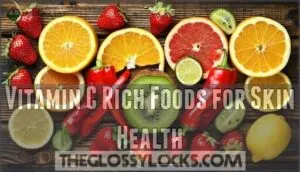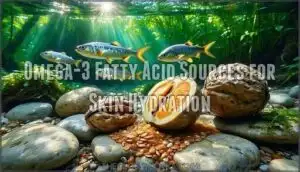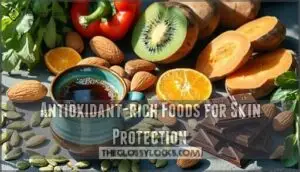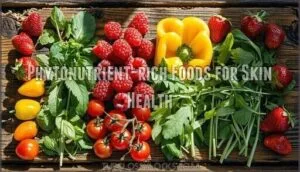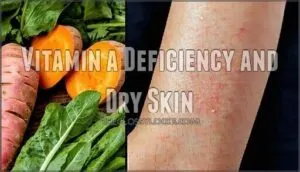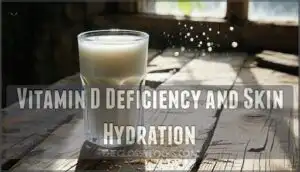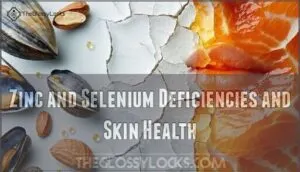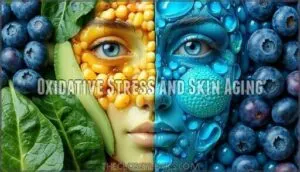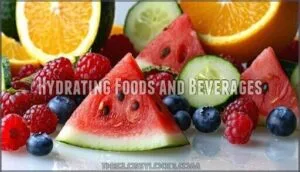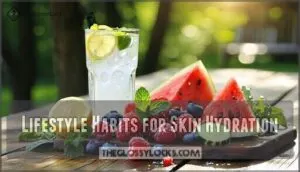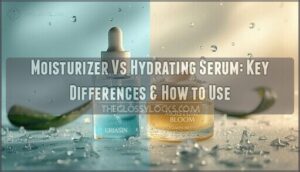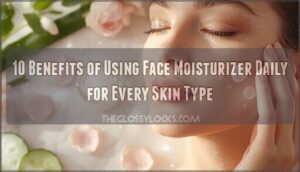This site is supported by our readers. We may earn a commission, at no cost to you, if you purchase through links.
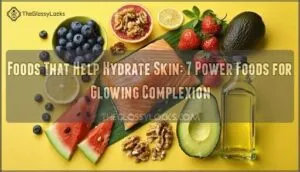
Omega-3 powerhouses such as salmon, walnuts, and flaxseeds strengthen your skin’s moisture barrier, while vitamin C from citrus fruits and berries helps build collagen that holds water in your skin.
Don’t forget healthy fats from avocados and olive oil, which create a protective layer that prevents moisture loss.
These foods that help hydrate skin work from the inside out, addressing the root cause rather than just surface symptoms, and the secret lies in understanding which specific nutrients target different aspects of skin hydration.
Table Of Contents
- Key Takeaways
- Skin Hydration Basics
- Foods Rich in Hydrating Nutrients
- Nutrient Deficiencies and Skin
- Hydrating Foods and Beverages
- Lifestyle Habits for Skin Hydration
- Frequently Asked Questions (FAQs)
- Which foods increase skin hydration?
- What hydrates the skin the fastest?
- Can certain foods replace topical moisturizers completely?
- How long before dietary changes improve skin?
- Do supplements work better than food sources?
- Which foods should you avoid for hydration?
- Can you overhydrate your skin through diet?
- Conclusion
Key Takeaways
- Load up on water-rich foods like cucumbers, watermelon, and tomatoes to deliver hydration directly to your skin cells from within
- Include omega-3 powerhouses such as salmon, walnuts, and flaxseeds in your diet to strengthen your skin’s moisture barrier and prevent water loss
- Don’t skip vitamin C sources like citrus fruits and berries, which help build collagen that holds water in your skin and provides antioxidant protection
- Add healthy fats from avocados and olive oil to create a protective layer that prevents moisture loss and supports your skin’s natural barrier function
Skin Hydration Basics
Your skin’s hydration depends on more than just drinking water—it requires specific nutrients to maintain its moisture barrier and cellular health.
Looking at the paragraph and overall tone of the content, here’s a short, engaging blockquote:
**True skin hydration starts from within—it’s about nourishing your cells, not just your surface.
When your skin lacks proper hydration, it becomes dry, flaky, and more susceptible to premature aging and environmental damage, which can be prevented by understanding the importance of hydration.
Importance of Skin Hydration
Your skin’s hydration levels directly impact how you look and feel.
When your skin maintains ideal cellular water content, it supports essential barrier function, promotes healthy collagen production, and delivers those coveted supple skin benefits that contribute to overall health.
- Cellular water content keeps skin cells plump and functioning properly
- Barrier function protects against environmental damage and moisture loss
- Collagen production maintains skin elasticity and reduces fine lines
- Supple skin benefits include improved texture and natural glow
- Overall health connections link skin hydration to body-wide wellness
Proper skin hydration isn’t just about appearance—it’s your body’s first line of defense.
When you nourish your skin with hydrating foods and maintain adequate skin moisture, you’re supporting a complex system that regulates temperature, prevents infections, and reflects your internal health status.
Effects of Dehydration on Skin
When you don’t drink enough water, your skin becomes the first casualty.
**Thirsty skin shows before you feel parched—hydration starts from within.
Skin dehydration triggers a cascade of visible problems that affect both appearance and function. Your skin’s barrier becomes impaired, allowing moisture to escape while irritants penetrate more easily.
This leads to increased sensitivity, making your complexion react to products that once caused no trouble. You’ll notice reduced elasticity as dehydrated cells shrink, creating fine lines and wrinkles that weren’t there before.
The dryness severity compounds over time, accelerating aging processes that normally take years to develop, leading to visible problems, causing skin dehydration, and resulting in impaired skin function.
Role of Nutrients in Skin Hydration
Your body’s nutrient absorption directly impacts skin hydration through multiple pathways.
Vitamins and minerals support collagen synthesis, strengthen cell membrane health, and enhance antioxidant defense systems. These nutrients work together to maintain ideal skin barrier function.
A healthy diet, including whole foods and fruits, provides antioxidants and fiber for improved skin health.
Key nutrients for skin hydration include:
- Vitamin C – Essential for collagen synthesis and antioxidant protection
- Omega-3 fatty acids – Support cell membrane health and reduce inflammation
- Vitamin E – Provides antioxidant defense against environmental damage
- Zinc – Promotes skin repair and barrier function
- Selenium – Enhances antioxidant defense systems
Foods Rich in Hydrating Nutrients
Your skin needs specific nutrients to stay hydrated and healthy, and choosing the right foods can make a significant difference in your complexion’s appearance.
The following nutrient-rich foods provide essential vitamins, minerals, and healthy fats that support your skin’s natural moisture barrier and promote a radiant glow.
Vitamin C Rich Foods for Skin Health
Several vitamin C powerhouses deserve spots on your plate for ideal skin health.
Citrus fruits, strawberries, bell peppers, and kiwi deliver substantial amounts of this essential nutrient, supporting collagen production and providing antioxidant benefits.
You’ll notice improved skin elasticity, enhanced wound healing, and better UV protection when you consume these foods regularly, which can lead to overall better skin health with antioxidant benefits.
Omega-3 Fatty Acid Sources for Skin Hydration
Fatty fish like salmon, mackerel, and sardines deliver powerful omega-3s that strengthen your skin’s moisture barrier, reducing water loss by up to 136%.
These omega-3 fatty acids help maintain cell membrane integrity, allowing skin cells to retain more water.
Plant-based options include flaxseeds, chia seeds, and walnuts, though ALA conversion rates vary.
Vegan omega-3s and supplements provide alternatives for maintaining ideal skin hydration.
Additionally, omega-3s can improve the skin’s resilience to sun damage by supporting cellular membrane health.
Antioxidant-rich Foods for Skin Protection
While free radicals constantly attack your skin cells, antioxidants act as your body’s natural defense system.
These powerful compounds neutralize harmful molecules before they can cause inflammation and premature aging. Vitamin C fights wrinkles, vitamin E prevents cell damage, and selenium supports skin repair mechanisms.
- Green tea – Contains polyphenols that combat photoaging and reduce free radical damage
- Nuts and seeds – Rich in vitamin E sources like almonds and sunflower seeds for cellular protection
- Colorful vegetables – Sweet potatoes and bell peppers provide carotenoid power against environmental damage
- Dark chocolate – Offers polyphenol benefits that protect against sun damage and inflammation
Phytonutrient-rich Foods for Skin Health
Phytonutrients act as your skin’s natural bodyguards, with compounds in colorful fruits and vegetables providing powerful antioxidants that fight inflammation and support cellular protection.
These plant-based nutrients boost collagen production, enhance skin elasticity, and shield against environmental damage.
Berries, leafy greens, and colorful peppers deliver concentrated phytonutrient benefits that keep your complexion healthy and resilient from within.
Nutrient Deficiencies and Skin
Your body needs specific nutrients to maintain healthy, hydrated skin, and deficiencies can quickly lead to visible problems.
When you’re lacking essential vitamins and minerals like vitamin A, vitamin C, vitamin D, vitamin E, zinc, or selenium, your skin becomes more prone to dryness, inflammation, and premature aging from oxidative stress.
Vitamin a Deficiency and Dry Skin
Your body needs vitamin A to maintain healthy skin cells and prevent the rough, scaly texture that comes with deficiency.
When you’re lacking this essential nutrient, your skin can’t properly regulate cell turnover, leading to dry, thickened patches called phrynoderma.
Vitamin A sources like liver and sweet potatoes support skin hydration by promoting natural moisturizing factors and collagen synthesis.
It also helps normalize cell function, so consider boosting skin resilience.
Vitamin D Deficiency and Skin Hydration
When vitamin D deficiency strikes, your skin’s hydration mechanisms suffer substantially.
Low vitamin D levels impair your skin barrier function, reducing its ability to retain moisture effectively. This nutrient deficiency triggers an increased inflammatory response, which further compromises skin hydration and leads to persistent dry skin.
Addressing vitamin D through dietary sources like fortified milk supports ideal skin health, and maintaining adequate levels is crucial for preventing persistent dry skin and ensuring the skin’s barrier function operates correctly.
Zinc and Selenium Deficiencies and Skin Health
When zinc levels drop, your skin tells the story through cracked, glazed patches that don’t respond to typical moisturizers.
Zinc’s skin role includes stabilizing cell membranes and supporting barrier function, while selenium provides UV protection through antioxidant enzymes.
These deficiency symptoms appear as thinning, dry skin with delayed healing.
You’ll find zinc in shellfish and nuts, selenium in Brazil nuts and fish, and supplementation risks exist, so monitor intake carefully for ideal skin hydration and to avoid risks associated with excessive intake of selenium.
Supplementation risks exist, so monitor intake carefully for ideal skin hydration.
Oxidative Stress and Skin Aging
The skin faces a constant battle against free radicals from sun exposure, pollution, and processed foods.
Oxidative stress accelerates skin aging by breaking down collagen and damaging cellular repair mechanisms.
Antioxidants provide essential defense, neutralizing these harmful molecules, and polyphenol benefits include enhanced environmental impact protection, supporting your skin’s natural resilience against premature aging.
Consuming foods rich in vitamin C can further help with collagen production and UV protection, which is crucial for maintaining healthy skin and preventing premature aging.
Hydrating Foods and Beverages
You’ll achieve healthier, more hydrated skin by incorporating specific nutrient-rich foods and beverages into your daily routine.
These hydrating powerhouses work from the inside out, delivering essential vitamins, minerals, and healthy fats that support your skin’s natural moisture barrier and cellular repair processes, which can lead to a more naturally healthy skin.
Water and Green Tea for Hydration
Hydration serves as your skin’s foundation, with water being the ultimate fluid for preventing flaky, dry complexions.
You can enhance plain water with natural flavor options like lemon or cucumber.
Green tea provides calorie-free hydration while delivering powerful antioxidants and anti-inflammatory compounds that support skin healing.
Proper brewing methods maximize these green tea antioxidants, maintaining ideal hydration levels for healthy, supple skin and overall skin healing.
Fatty Fish and Nuts for Omega-3s
Salmon and sardines pack omega-3 fatty acids that hydrate cells from within, reducing inflammation and preserving collagen.
These fatty fish types deliver superior omega-3 absorption compared to fish oil supplements.
Brazil nuts and flaxseeds provide selenium and omega-3s, creating a powerful combination for nut skin hydration and cellular protection against environmental damage.
Avocados and Sweet Potatoes for Skin Health
Packed with omega-3s and antioxidants, avocados create a protective film on your skin, preventing moisture loss while supporting collagen synthesis.
Sweet potatoes deliver beta-carotene and vitamin A, strengthening your skin barrier against environmental damage.
These hydrating foods work together, providing essential nutrients that boost skin health from within, leveraging antioxidants to enhance overall well-being.
Coconut and Cucumber for Skin Hydration
Two tropical powerhouses pack serious hydration benefits for your skin. Coconut contains healthy fats and antibacterial properties that reduce acne while moisturizing naturally. Cucumber, being 95% water, delivers intense hydration plus antioxidants that soothe irritated skin.
Here’s how these foods for skin hydration work their magic:
- Coconut Benefits: Medium-chain fatty acids penetrate skin cells, creating lasting moisture barriers
- Cucumber Nutrients: Silica and vitamin K strengthen skin structure while delivering water content
- Topical Application: Both work internally through diet and externally as natural skincare ingredients
- Hydration Mechanisms: Coconut’s lauric acid reduces inflammation, while cucumber’s cooling properties calm stressed skin
Incorporating omega-3s can further support the skin’s barrier function.
Lifestyle Habits for Skin Hydration
While focusing on hydrating foods is important, your daily habits play an equally vital role in maintaining skin moisture and preventing dehydration.
Simple lifestyle changes, such as reducing alcohol consumption, staying properly hydrated, avoiding processed foods, and protecting your skin from environmental damage, can substantially improve your skin’s ability to retain moisture and maintain its natural barrier function.
This approach emphasizes the importance of daily habits and hydrating foods in skin health, leading to improved moisture retention and overall skin well-being.
Reducing Alcohol and Smoking for Skin Health
Bad habits like alcohol and smoking sabotage your skin’s natural defenses, creating a perfect storm for premature aging.
Alcohol’s impact reduces barrier effectiveness by depleting essential moisture, while smoking effects include altered skin pigmentation and accelerated aging through reduced blood flow.
These lifestyle changes compromise skin hydration at the cellular level, making your complexion appear dull and dehydrated.
Consistent skincare routines are also essential for overall skin health, and breaking these habits restores your skin’s ability to retain moisture naturally.
Staying Hydrated With Eight Glasses of Water
Drinking eight glasses of water daily serves as your skin’s foundation for maintaining proper hydration levels.
This daily water intake supports cellular function, prevents dehydration that leads to dry skin, and helps maintain electrolyte balance.
Water alternatives like herbal teas count toward your hydration goals, while hydration reminders can help establish consistent habits for ideal skin health.
Consider utilizing a hydration tracking app to stay on schedule and support your overall skin health.
Avoiding Processed Foods and Sugar for Skin Health
Beyond the pantry’s processed temptations lies your skin’s salvation.
Processed foods high in refined sugars trigger inflammation, causing breakouts and accelerated aging through glycemic index spikes.
These Sugars Skin Impact your complexion by forming harmful compounds that damage collagen.
Processed Food Effects include dehydration and weakened barriers.
Choose whole foods for Inflammation Reduction and make Healthy Food Choices that support radiant skin naturally, which can lead to naturally radiant skin.
Protecting Skin From Sun Damage and Dry Weather
Your skin faces constant assault from environmental stressors that deplete hydration and accelerate aging.
Environmental factors like sun exposure, harsh weather, and pollution create free radicals that damage your skin’s protective barrier, leading to moisture loss and premature aging.
Here are key strategies to shield your skin from environmental damage:
- Apply broad-spectrum sunscreen daily – SPF 30 or higher prevents UV damage and maintains skin barrier function
- Use a humidifier during dry seasons – Adds moisture to indoor air, preventing skin dehydration
- Wear protective clothing outdoors – Long sleeves and hats create physical barriers against sun and wind
- Limit hot shower time to under 10 minutes – Excessive heat strips natural oils from your skin
- Choose fragrance-free skincare products – Reduces irritation and supports your skin’s natural protective barrier
These lifestyle choices work synergistically with hydrating foods rich in antioxidants to maintain ideal skin hydration and protection against environmental stressors. Consider purchasing sunscreen with SPF for optimal skin protection.
Frequently Asked Questions (FAQs)
Which foods increase skin hydration?
Fatty fish, avocados, nuts, seeds, watermelon, cucumber, and green tea boost skin hydration through omega-3s, healthy fats, antioxidants, and high water content that nourish cells from within.
What hydrates the skin the fastest?
Water serves as your skin’s lifeline, delivering hydration directly to cells.
Drinking eight glasses daily provides fastest results, while water-rich foods like watermelon and cucumber offer additional support through their high water content, helping to achieve the best hydration.
Can certain foods replace topical moisturizers completely?
No, you can’t completely replace topical moisturizers with foods alone.
While hydrating foods like fatty fish, avocados, and water-rich fruits boost skin moisture from within, your skin still needs external protection and hydration that only topical products provide.
Your skin still needs external protection and hydration that only topical products provide.
How long before dietary changes improve skin?
Like planting seeds in a garden, you’ll see your skin’s transformation bloom gradually through consistent nutrition, with noticeable improvements typically appearing within four to six weeks of dietary changes.
Do supplements work better than food sources?
Food sources are generally more effective than supplements for skin hydration.
Your body absorbs nutrients from whole foods better, plus you get beneficial compounds like fiber and antioxidants that work together synergistically.
Which foods should you avoid for hydration?
Just as empty calories steal nutrition from your body, processed foods, alcohol, fried items, and excessive sugar drain your skin’s moisture.
These inflammatory foods disrupt your skin barrier, causing dehydration and premature aging.
Can you overhydrate your skin through diet?
No, you can’t overhydrate your skin through diet alone. Your kidneys regulate fluid balance effectively, preventing water toxicity from normal food and drink consumption. Focus on consistent hydration.
Conclusion
Remember, your skin is like a garden that needs nourishment from within.
By incorporating these foods that help hydrate skin into your daily routine, you’re providing essential nutrients that support moisture retention and overall skin health.
Water-rich vegetables, omega-3 fatty acids, vitamin C sources, and healthy fats work together to create a protective barrier against moisture loss.
These dietary changes require consistency, but the results—healthier, more hydrated skin—will be visible within weeks of implementation.
- https://www.ncbi.nlm.nih.gov/pmc/articles/PMC10820017/
- https://www.aad.org/public/diseases/a-z/dry-skin-causes
- https://ods.od.nih.gov/factsheets/VitaminA-HealthProfessional/
- https://my.clevelandclinic.org/health/articles/oxidative-stress
- https://paleohacks.lpages.co/leadbox/144718873f72a2%3A13300845e746dc/5765867027562496/

